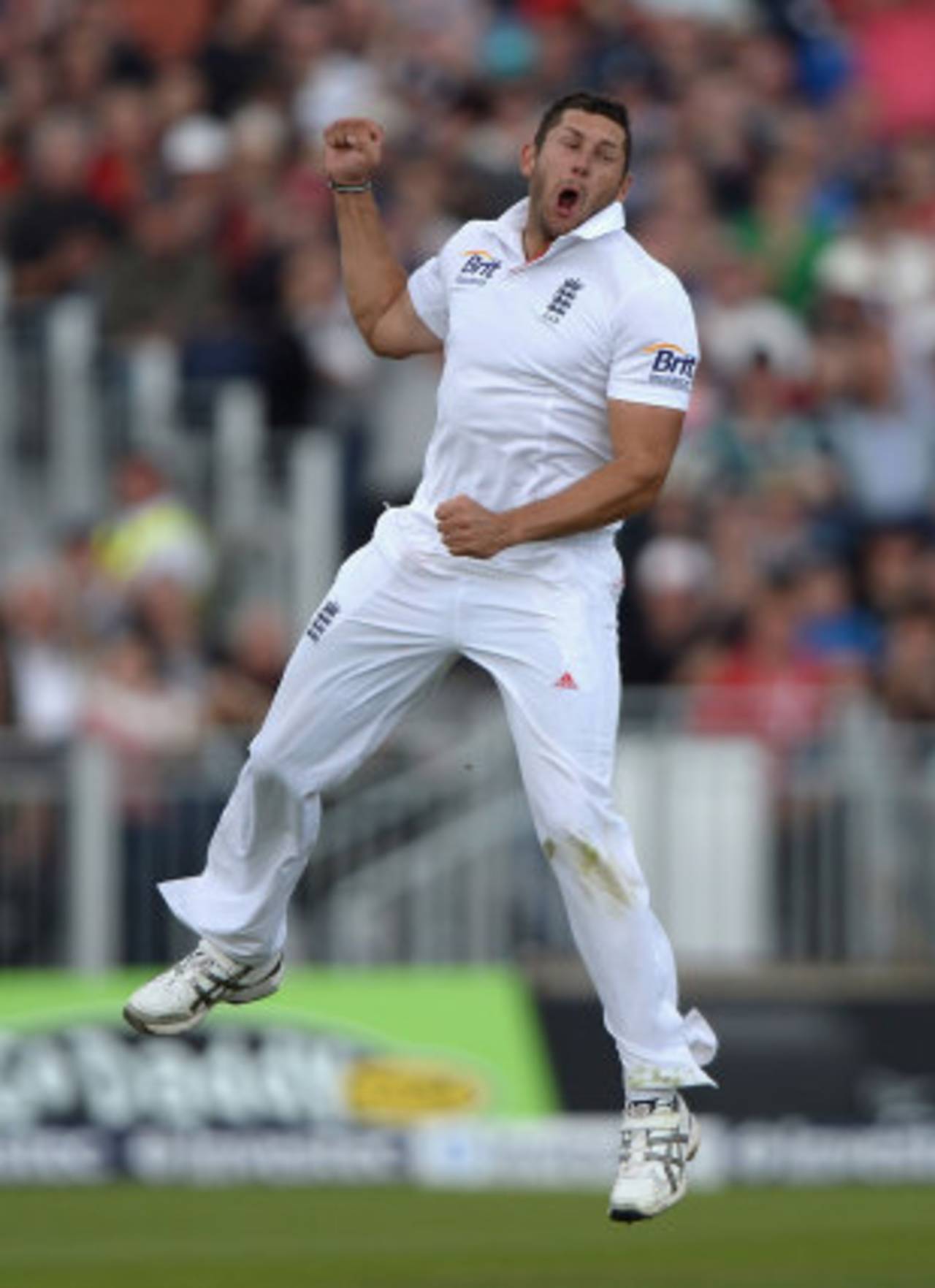The unsung micro-Botham
In this Ashes series, Tim Bresnan was statistically unspectacular but impactful
Andy Zaltzman
05-Sep-2013

No, he doesn't leap out of the 2013 Ashes scorecards, but look closely and you'll notice that he's tapping his foot in rhythm • Getty Images
Has a player who did not score a half-century or take three wickets in an innings ever had a greater impact on a series than Tim Bresnan on this year's Ashes? He totalled 103 runs at an average of 25 and ten wickets at fractionally under 30. Hardly numbers that explode out of the scorebook, but his performance was of enormous value.
With the bat, his turgid nightwatchman's grind at Lord's helped to snuff out Australia's microscopic hopes of coming back from the dead, then, more importantly, he played with solidity in the first innings at the Riverside, helping Graeme Swann and James Anderson add 40 precious runs for the last two wickets. His second-innings 45 - solid while supporting specialist batsmen, then punishingly aggressive with the tail - was priceless, as England's last three wickets added a match-turning 79.
With the ball, nine of his ten wickets were of top-six batsmen, including two of the first three wickets at Lord's, sparking the Australian implosion that essentially confirmed the destination of the urn, and the pivotal wicket of David Warner in Durham, just as the intermittently brilliant left-hander was on the verge of turning the game decisively Australia's way. He added the wicket of Shane Watson, leaving Brad Haddin and the tail to either (a) score 120 to win, or (b) be swept away by Stuart Broad. They chose (b). Or perhaps had (b) chosen for them by Broad.
He was statistically unspectacular but impactful. In his five Ashes Tests, two in the last series and three this time, 17 of his 21 wickets have been top-six batsmen; one more was Haddin; he has also dismissed the bowling allrounders Mitchell Johnson and Ashton Agar; his sole genuine tail-end Ashes wicket was Ben Hilfenhaus, and even that had the added glory of being the final, Ashes-confirming wicket in the MCG Test in 2010-11.
Like Ian Bell, he was emerging from a significant slump. It was aggravated by injury but two wickets for 420 in four Tests, against South Africa and in India, while conceding 3.5 runs per over, and failing to pass 20 with the bat, were hardly numbers to write home about, unless that missive was to say, "Stock up on my favourite biscuits, I won't be playing much Test cricket for a while."
The selectors trusted him to recapture his form of 2010 and 2011; Bresnan rediscovered his game. Both deserve great credit.
He is the first bowler to have taken ten or more wickets in an Ashes series without taking three in an innings, and only the third England bowler to reach double figures in any series without bagging a three-for (Flintoff took 10 at 59 in five Tests against South Africa in 2003, and Laker 11 at 29 in the five-match rubber in South Africa in 1956-57). Only four other players have scored at least 100 runs in a series at an average of 25 or higher, and taken at least ten wickets at an average of 30 or lower, without either scoring a half-century or taking four wickets in an innings. And only Bresnan has done so without even taking three in an innings. To future cricket-loving generations, he might barely be noticeable on the 2013 Ashes scorecards, but Bresnan has been England's unsung micro-Botham.
I'll be back in late September, with some thoughts on Cook's much-maligned and much-praised captaincy - I think both sides of the argument are, essentially, right. I will also, hopefully, be touring India with a cricket-and-global-politics-themed stand-up show in October. I'll keep you posted here, and on my @ZaltzCricket Twitter feed.
In the meantime, one final statistic for all those who sat through England's miserable batting on Friday and thought to themselves: "I have paid £65 for this. I wanted to see history being made." Well, you did see history being made. For the first time ever in Test history (admittedly including only games for which balls faced have been recorded), a team's top six all scored 25 or more, and all at a strike rate of less than 40 runs per 100 balls. This was not "proper Test cricket" or "a day for the connoisseur". It was unnecessary, and unparalleled, (and, I would argue, not particularly effective) collective hyper-caution.
Until late September, goodbye, all hail to the Sledgehammer of Eternal Justice and his three series-defining centuries of Dravidian silk and steel, some of the finest English batsmanship of all time.
Andy Zaltzman is a stand-up comedian, a regular on the BBC Radio 4, and a writer